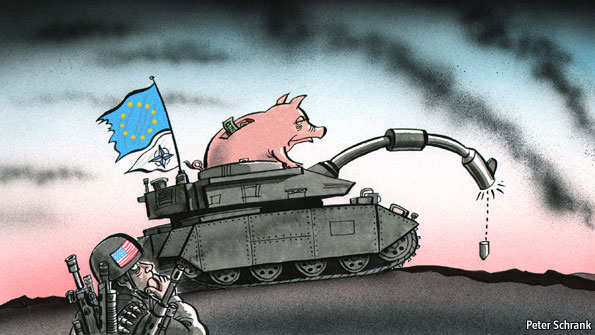
From Tomas Valasek, the Center for European Reform: The manner in which the Libya war started, and its conduct so far, suggest that the US-European military relationship is finding a new footing. The Americans have managed to reduce their role in discretionary operations without putting NATO’s credibility and its mutual defence pledge in question, and the Europeans have taken over some roles from the Americans. Their mutual alliance, while less unified, remains sufficiently credible to keep allies interested in membership, even if divisions have reduced its military power.
This is not to say that all is well. The new division of labour between Europe and the US can only work if European governments continue to invest in their militaries. They are failing to do this: as one new study notes, over the past few years, small European countries have cut defence budgets by over 30 per cent on average. The big ones are faring better but not by much: the German defence ministry has been ordered to find savings of 25 per cent over five years and France has reduced projected spending over the next three years by ten per cent. The Libyan conflict has done little to change the trend: in the UK, top military personnel grumble about fighting a war amidst budget cuts (7.5 per cent over five years) but the defence ministry, if anything, is likely to reduce forces more steeply (mismanagement left it without the money to pay for equipment that it has contracted to buy). The Europeans, on balance, seem readier to reduce military ambitions than to increase funds: the economic crisis is not going away and defence is low on European governments’ lists of priorities.
This is a future problem rather than a present one: because years or decades pass between the purchase or development of military equipment and delivery, the European allies are fighting the war in Libya with equipment they bought in the 1990s, if not earlier. And, as argued above, they have done reasonably well, albeit only with significant help from the US. The risk is that in five to ten years, European militaries will have shrunk beyond recognition, as Anders Fogh Rasmussen, NATO’s secretary general, warned recently. If and when that happens, the Europeans will lose the capacity to act in situations where the Americans play only a limited role. Without real capabilities, Europe will also cease to offer meaningful help to the US, and Washington will have fewer reasons to take the alliance seriously. This is all the more true because of the generational change in the US policy establishment, against which Secretary Gates warned in his valedictory speech.
However, there are things that the Europeans can do in the meantime to offset the impact of the cuts, from getting rid of legacy Cold War equipment to buying and developing new weapons jointly. Most importantly, as a recent CER report argues, they ought to integrate much of the support infrastructure that underpins the militaries’ work: exercise ranges, maintenance facilities or military academies.11 This is where, along with personnel costs, 80 per cent of European defence money is spent, and spent very wastefully. There is evidence that the Europeans are moving in the right direction – the French and the British recently agreed to share the costs of building and maintaining weapons, and more governments are exploring other ideas for collaboration. This trend, along with Europe’s newfound will to assume greater responsibility for the security in its own neighbourhood, ought to give the Americans some reason for optimism – and it should be a source of quiet confidence and encouragement to Europe.
Tomas Valasek is director of foreign policy and defence at the Center for European Reform. (graphic: Peter Schrank/Economist) (via Real Clear World)
Image: economist%206%2018%2011%20Europe%20military%20failings.jpg
